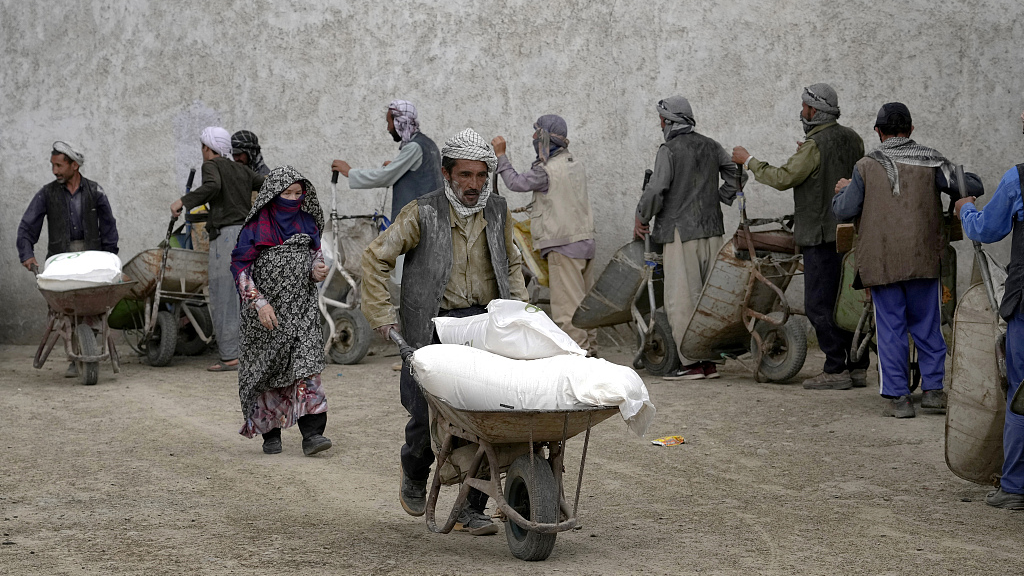
A special TV forum entitled "Afghanistan in Transition" was produced by CGTN and Shamshad TV. /CGTN
A special TV forum entitled "Afghanistan in Transition" was produced by CGTN and Shamshad TV. /CGTN
China Global Television Network (CGTN) organized a special TV forum entitled "Afghanistan in Transition" to call global attention to the challenges the country faces a year after the withdrawal of U.S. troops in August 2021.
Senior government officials, international organization representatives and scholars inside and outside Afghanistan discuss solutions to the humanitarian challenges that have befallen the country, as well as potential areas of cooperation for post-war reconstruction.
Read more:
Afghanistan in Transition – path to resolving the humanitarian crisis
Afghanistan in Transition – Path to reconstruction and the way forward
The program was co-produced by CGTN and Shamshad TV from studios in Beijing and Kabul, the first such collaboration between mainstream Chinese and Afghan media.
In his opening speech, United Nations Under-Secretary-General for Humanitarian Affairs and Emergency Relief Coordinator Martin Griffiths called on the world to join hands and stand in solidarity with the Afghan people.
"Nineteen million Afghans, nearly half the population, remain food insecure, of which 6.6 million people are at emergency levels of food insecurity, the largest number in one single country," Griffiths said.
China's special envoy for Afghan affairs Yue Xiaoyong echoed President Xi Jinping in his keynote speech, saying that a peaceful and stable Afghanistan is the aspiration of all Afghan people and that peace in Afghanistan is in the common interest of the region and the international community.
"China is ready to work with all parties to implement both bilateral and multilateral consensus on Afghanistan issues, including the Tunxi Initiative, and keep on contributing to lasting peace and reconstruction in Afghanistan," he said.
Read more:
Special Envoy Yue Xiaoyong shares China's views on the Afghanistan issue

People receive food rations distributed by a humanitarian aid group in Kabul, Afghanistan, May 10, 2022. /CFP
People receive food rations distributed by a humanitarian aid group in Kabul, Afghanistan, May 10, 2022. /CFP
Pierre Kraehenbuehl, personal envoy of the president of the International Committee of the Red Cross (ICRC) in China and head of the ICRC's Regional Delegation for East Asia, said the dire situation for Afghan men, women and children cannot be resolved only through humanitarian assistance.
"That requires economic investment, [and] that requires international cooperation, and many of the actors who withdrew last year should also be called on to re-engage with the country," he said.
The forum featured representatives from Afghanistan's interim government and previous administrations and representatives from China, Pakistan, Uzbekistan, India and the United States.
"International attention (in Afghanistan) has declined because of the Biden administration's inability to deal with the issue of Afghanistan and the shameful exit the U.S. had last year," said Muhammad Sulaiman Bin Shah, former Afghan Deputy Minister of Industry and Commerce.
"It's a combination of issues from the international, regional as well as home affairs that have crippled the economy in Afghanistan."
Abdul Qahar Balkhi, spokesperson of the foreign ministry of the interim government, called for the release of $7 billion in Afghan funds held by the U.S.
"As foreign troops and occupation forces pulled out of Afghanistan, they not only ended jobs and opportunities, but they also imposed illegal and immoral sanctions on Afghanistan, which has escalated the situation," he said.
The forum was streamed live via CGTN's digital platforms, and its Pashto edition will be aired by Shamshad TV in Afghanistan.
It has received media attention in Afghanistan and around the world and has been picked up by over 600 media outlets, reaching an audience of nearly 300 million people.

